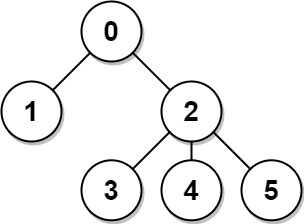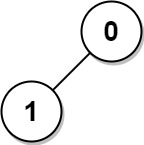2021-09-04 Daily-Challenge
Today is Saturday, I gonna review the tasks I've done this week, and finish today's leetcode's September LeetCoding Challenge with cpp.
LeetCode Review
Erect the Fence
too easy to review
Unique Binary Search Trees II
too easy to review
Array Nesting
too easy to review
Majority Element II
too easy to review
Spiral Matrix III
too easy to review
Minimum Area Rectangle II
too easy to review
Largest Number At Least Twice of Others
too easy to review
Sorting the Sentence
too easy to review
Range Addition II
too easy to review
Find Minimum in Rotated Sorted Array
too easy to review
September LeetCoding Challenge 4
Description
Sum of Distances in Tree
There is an undirected connected tree with n nodes labeled from 0 to n - 1 and n - 1 edges.
You are given the integer n and the array edges where edges[i] = [ai, bi] indicates that there is an edge between nodes ai and bi in the tree.
Return an array answer of length n where answer[i] is the sum of the distances between the ith node in the tree and all other nodes.
Example 1:

Input: n = 6, edges = [[0,1],[0,2],[2,3],[2,4],[2,5]]
Output: [8,12,6,10,10,10]
Explanation: The tree is shown above.
We can see that dist(0,1) + dist(0,2) + dist(0,3) + dist(0,4) + dist(0,5)
equals 1 + 1 + 2 + 2 + 2 = 8.
Hence, answer[0] = 8, and so on.
Example 2:

Input: n = 1, edges = []
Output: [0]
Example 3:

Input: n = 2, edges = [[1,0]]
Output: [1,1]
Constraints:
1 <= n <= 3 * 10^4edges.length == n - 1edges[i].length == 20 <= ai, bi < nai != bi- The given input represents a valid tree.
Solution
auto speedup = [](){
cin.tie(nullptr);
cout.tie(nullptr);
ios::sync_with_stdio(false);
return 0;
}();
class Solution {
vector<int> dp, children, answer;
vector<vector<int>> neighbors;
void init(int N, vector<vector<int>>& edges) {
dp.resize(N);
children.resize(N, 1);
answer.resize(N);
neighbors.resize(N);
for(auto &edge : edges) {
neighbors[edge[0]].push_back(edge[1]);
neighbors[edge[1]].push_back(edge[0]);
}
}
void initDP(int current, int parent) {
for(auto neighbor : neighbors[current]) {
if(neighbor == parent) continue;
initDP(neighbor, current);
children[current] += children[neighbor];
dp[current] += children[neighbor] + dp[neighbor];
}
}
void swapRootDP(int current, int parent) {
answer[current] = dp[current];
for(auto neighbor : neighbors[current]) {
if(neighbor == parent) continue;
dp[current] -= children[neighbor] + dp[neighbor];
children[current] -= children[neighbor];
dp[neighbor] += dp[current] + children[current];
children[neighbor] += children[current];
swapRootDP(neighbor, current);
dp[neighbor] -= dp[current] + children[current];
children[neighbor] -= children[current];
dp[current] += children[neighbor] + dp[neighbor];
children[current] += children[neighbor];
}
}
public:
vector<int> sumOfDistancesInTree(int N, vector<vector<int>>& edges) {
init(N, edges);
initDP(0, -1);
swapRootDP(0, -1);
return move(answer);
}
};
// Accepted
// 73/73 cases passed (390 ms)
// Your runtime beats 11.33 % of cpp submissions
// Your memory usage beats 49.76 % of cpp submissions (87.4 MB)